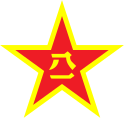Political Work Department of the Central Military Commission
| 中央军委政治工作部 | |
 | |
| Agency overview | |
|---|---|
| Preceding |
|
| Type | Functional department of the Central Military Commission |
| Jurisdiction | People's Liberation Army |
| Headquarters | Ministry of National Defense compound ("August 1st Building"), Beijing |
| Agency executive |
|
| Parent department | Central Military Commission |
Politics of China |
|---|
 |
|
The Political Work Department of the Central Military Commission (Chinese: 中央军委政治工作部) is the chief political organ under the Central Military Commission. It was created in January 2016 following the 2015 People's Republic of China military reform. Its predecessor was the People's Liberation Army General Political Department.
The department leads all political and cultural activities in the People's Liberation Army.[1] Its current director is Admiral Miao Hua; its deputy directors are and .[2]
The Political Work Department's Liaison Department controls a united front organization called the China Association for International Friendly Contact (CAIFC) that is active in overseas intelligence gathering and influence operations.[3][4][5][6]
History[]
In November 2015 the General Political Department of the Central Military Commission was abolished and was replaced with the Political Work Department as part of Chairman Xi Jinping's military reforms.[7][8] Its role is to integrate the CCP and its ideology and propaganda into the People's Liberation Army. In January 2016, the Political Work Department became official.
Structure[]
This section does not cite any sources. (August 2021) |
The following Bureaus are Subordinate to the Political Work Department:
- General Office (办公厅) - The office of senior headquarters staff.
- Organization Bureau (组织局) - Responsible for the organization and structure of the military.
- Cadre Bureau (干部局) - Responsible for party members in the military.
- Military and Civilian Bureau (兵员和文职人员局) - Responsible for all civilian and enlisted military staff.
- Propaganda Bureau (宣传局) - Responsible for publishing communist party propaganda.
- Online Public Opinion Bureau (网络舆论局) - Responsible for controlling the Chinese Military Network.
- Mass Work Bureau (群众工作局) - Its Director is Major General Li Hui (李辉), and is supported by Deputy Directors Colonel Ba Mouguo (巴谋国) and Air Force Major General Chen Zuosong (陈作松).
- Subordinate Work Bureau (直属工作局) - Its director is Air Force Major General Chen Zuosong (陈作松), and is supported by Deputy Directors Major General Liu Yongsuo (郝先维) and Colonel Hao Xianwei (刘永锁).
- Liaison Bureau (联络局) - Conduct liaison and intelligence work.
- Veterans Bureau (老干部局) - Responsible for veterans affairs. Its Director is Major General Wang Yuezhong (王岳忠), and Deputy Directors Xiang Shuangcheng (向双成) and Zhang Minggang (张明刚).
Attached agencies and units[]
- Central Military Band of the People's Liberation Army of China
- Central Military Commission Political Work Department Song and Dance Troupe
References[]
- ^ Mattis, Peter (2018-01-30). "China's 'Three Warfares' in Perspective". War on the Rocks. Archived from the original on 2019-10-26. Retrieved 2019-10-26.
- ^ Li, Nan (February 26, 2018). "Party Congress Reshuffle Strengthens Xi's Hold on Central Military Commission". Jamestown Foundation. Archived from the original on October 26, 2019. Retrieved 2019-10-26.
- ^ Hsiao, Russell (June 26, 2019). "A Preliminary Survey of CCP Influence Operations in Japan". Jamestown Foundation. Archived from the original on December 7, 2019. Retrieved 2019-11-30.
- ^ Stokes, Mark; Hsiao, Russell (October 14, 2013). "The People's Liberation Army General Political Department: Political Warfare with Chinese Characteristics". Project 2049 Institute. Archived from the original on December 29, 2019. Retrieved 2019-11-30.
- ^ Diamond, Larry, ed. (2019). China's Influence and American Interests : Promoting Constructive Vigilance. Chicago: Hoover Institution Press. ISBN 978-0-8179-2288-7. OCLC 1107586465.
- ^ Joske, Alex (June 9, 2020). "The party speaks for you: Foreign interference and the Chinese Communist Party's united front system". Australian Strategic Policy Institute. Archived from the original on June 9, 2020. Retrieved June 9, 2020.
- ^ Kosaka, Tetsuro (January 28, 2016). "China's military reorganization could be a force for destabilization". The Nikkei. Archived from the original on October 26, 2019. Retrieved October 25, 2019.
- ^ Wen, Philip; Kang Lim, Benjamin (2017-09-08). "Sweeping change in China's military points to more firepower for Xi". Reuters. Archived from the original on 2019-10-26. Retrieved 2019-10-26.
See also[]
- Central Military Commission (China)
- 2016 establishments in China
- Chinese propaganda organisations
- Chinese intelligence agencies
- Information operations units and formations
- Chinese military stubs
